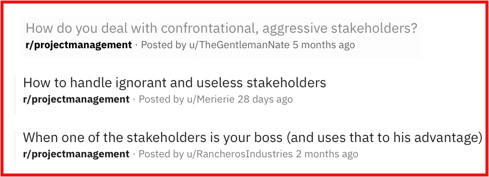Working with stakeholders in a project can be quite challenging. In fact, it’s one of the areas that project managers struggle with most.
You can see this in the comments on Reddit:

Here’s my favorite comment, referring to the “My Way” stakeholder:

As it seems, our relationship with stakeholders is often — not always — somewhere between GETTING NO SUPPORT to DIFFICULT to even TOXIC.
Why is that so?
Understanding stakeholder motivation is key
Many project managers are so caught up in their stakeholder issues that they fail to look “behind the curtain” and try to understand WHY their stakeholders aren’t willing to collaborate.
That’s a big mistake. Because in 95% of all cases it’s not that those people have bad intentions and follow an evil plan to sabotage your project.
Your stakeholders may have totally plausible reasons why they don’t support you.
And if you know their reasons you have a way to influence them and nudge them into the right direction.
Here are some common reasons why stakeholders resist change:
Reason 1: They are afraid of becoming irrelevant
You could also say: losing power, losing influence, losing status.
A project can quickly change our level of influence in the organization. A company-wide reorganization can shift power to other departments.
Here’s an example from my previous company:
Our company was trying to cut labor cost by consolidating accounting functions. Originally, every country office had their own accounting department. Now the plan was to centralize accounting at a few locations only. When the project team presented their plan to the local accounting heads, they were not amused. They were slamming doors and going crazy because they knew they would have to give up responsibility or even lose their job.
Wouldn’t you also be opposing change if you were to lose power?
Reason 2: They have a score to settle

In an ideal world, the departments in an organization are collaborating smoothly and focusing only on “facts” and work that needs to get done.
But that’s the ideal world. In reality, the collaboration in a company often feels more like a power game (like in politics). And there are often rivalries between departments. Rivalries and “unfinished business” that have been present for many years.
And they are still in people’s memory:
“You didn’t vote for our project 2 years ago, now I’m gonna block your project”
“You took the position I wanted, now I’m gonna make your life hard”
“You got a raise last year and I got none. Now see what happens …”
Nobody would say this in public, of course. But it’s typical for humans to think like that. And when you come in as a project manager with good intentions, you might be startled why you are not able to establish a good working relationship with some stakeholders. Well, those inter-departmental rivalries and fights might be the reason.
Reason 3: They are afraid of failure
Working in a project is SCARY for most people:
- There’s a lot of group work and large meetings (most people are uncomfortable in group settings)
- Your work is visible to everyone immediately (people are afraid of being judged)
- You are required to talk to a lot of people (most people are introverts)
- You have to make decisions (your boss will kick your ass if you make bad decisions)
- Projects are deadline driven (we all HATE deadlines)
Now, if you are the confident, extroverted and ambitious super-achiever, don’t make the mistake of believing everyone is like you. That is not the case! I used to think like that and it didn’t go well. I was running from one escalation to the next and almost burnt out. Things only got better once I changed my management style and showed more understanding for the fears, concerns and doubts of my team members.
Have some empathy for the people you’re working with.
Reason 4: They are already too busy
Everybody is charged to the limit with work. Just like you and me. We have dozens of obligations at work, and on top of that we have to manage our family life and be a good partner.
So then, you come to me and ask me to support your project.
Are you insane???
I’m already the last one to leave the office. I rarely see my kids because I leave home before they wake up and I come home only after they go to bed. I sometimes work on weekends just to keep up with work.
And now you come to me and put more work on my plate?
Come on. Try to see things from my perspective.
Reason 5: They are afraid of the project’s impact
As the head of a department you are responsible for processes and people. You have to make sure that customers are served best and that your team can cope with the workload.
This is an ongoing challenge because the business world is very dynamic and tasks can change. But once you have found a good way to get the work done, you don’t want to change your processes — never touch a running system.
But that’s what projects are generally about — changing processes. Changing the way we do things. How we serve our customers. How we collaborate as a team. How we manufacture products and so on.
And with those changes that projects usually bring forward, there’s a risk that your processes may actually get messed up and things get worse.
Want an example?
Let’s say you work in finance and you’re heading a project to reduce the amount of bad debt (the money that a company does not receive because customers don’t pay). That means tighter rules for credit sales — you are not going to sell to anybody but only to customers with a good credit rating. Now you discuss this with the Head of Sales in your company. Do you think he’s gonna like your idea? For sure not! Sales wants to generate more business and not less (which would be the consequence of tighter credit rules).
From this point of view, it’s perfectly understandable that some departments may oppose your project and will do everything they can to block your initiative.
How can you engage your stakeholders?
My goal with this article was to help you see things from the perspective of your stakeholders. I hope that some of the stakeholder behavior now makes more sense to you because you understand why people are acting the way they do.
The great thing is: Now you can brainstorm possible strategies for engaging your stakeholders and improving your relationship with them.
All the best,
Adrian
Author
-
Hi, I’m Adrian, a Senior Project Manager and the Creator of Tactical Project Manager, where I teach a pragmatic approach to project management. Led large-scale IT and business projects for over 10 years. My goal is to enable you to lead any project with confidence.
View all posts



